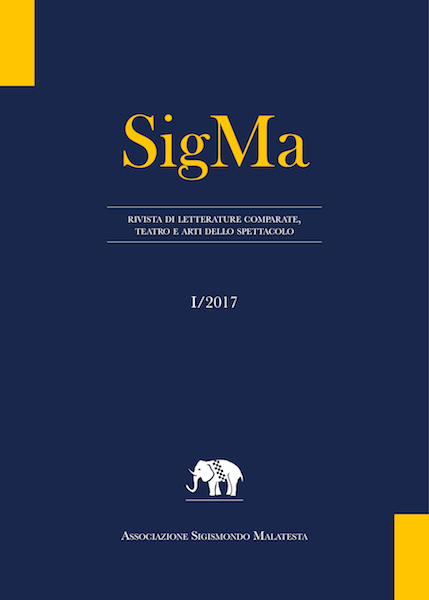Alfa e omega. Il senso della fine nella letteratura e nel cinema tedeschi dopo il 1945
Abstract
Nella letteratura e nel cinema tedeschi immediatamente successivi al 1945, la fine di un testo o di un film diventa parte di un esercizio collettivo dove la questione della catarsi non è mai innocente, ma aggravata dal peso di una colpa che va oltre alla richiesta di perdono. L’articolo prende le mosse da uno dei testi che trattano il motivo della fine in modo più programmatico: il Doctor Faustus di Thomas Mann, scritto tra gli anni della Guerra e quelli immediatamente successivi, è un romanzo che tratta i temi dell’apocalissi e della fine soprattutto anche attraverso la descrizione delle opere musicali del suo protagonista Adrian Leverkühn, in particolare due tra le ultime: Apocalipsis cum figuris e Lamentatio Doctoris Fausti. Apparentemente, non potrebbe esserci forse distanza maggiore che tra questa opera tarda del grande romanziere tedesco e la cinematografia tedesca immediatamente successiva alla fine del nazionalsocialismo. Eppure, quest’ultima può fornire esempi di un’altra modalità attraverso cui leggere il ‘senso della fine’ in Germania. Riorganizzata dagli alleati a Ovest come semplice mezzo di intrattenimento oppure come veicolo per imporre valori delle democrazie occidentali, la cinematografia della Germania Ovest mostra in questi anni, in alcuni casi, strategie non banali per rielaborare la fine all’interno della dimensione spettacolare e collettiva del film. Il genere principe è il melodramma, come avviene del resto nella cinematografia internazionale di quegli anni. Pur obbedendo alle regole che questo genere impone, il melodramma cinematografico può dare interpretazioni diverse del trauma della fine: secondo una modalità diretta e realistica, come ad esempio in In quei giorni (1947) di Helmut Käutner oppure attraverso filtri psicoanalitici, come ne La peccatrice (1951) di Willy Forst.
Downloads
SigMa pubblica in internet, ad accesso aperto, con licenza:
|
|
CCPL Creative Commons Attribuzione |
L'autore conserva il copyright sul suo contributo, consentendo tuttavia a chiunque "di riprodurre, distribuire, comunicare al pubblico, esporre in pubblico, rappresentare, eseguire e recitare l'opera", purché siano correttamente citati l'autore e il titolo della rivista. L’autore, al momento della proposta di pubblicazione, è inoltre tenuto a dichiarare che il contenuto e l’organizzazione dell’opera è originale e non compromette in alcun modo i diritti di terzi, né gli obblighi connessi alla salvaguardia di diritti morali ed economici di altri autori o di altri aventi diritto, sia per testi, immagini, foto, tabelle, sia per altre parti di cui il contributo può essere composto. L’autore dichiara altresì di essere a conoscenza delle sanzioni previste dal codice penale e dalle leggi speciali per l’ipotesi di falsità in atti ed uso di atti falsi, e che pertanto Reti Medievali è esente da qualsiasi responsabilità di qualsivoglia natura, civile, amministrativa o penale, e sarà dall'autore tenuta indenne da qualsiasi richiesta o rivendicazione da parte di terzi.

